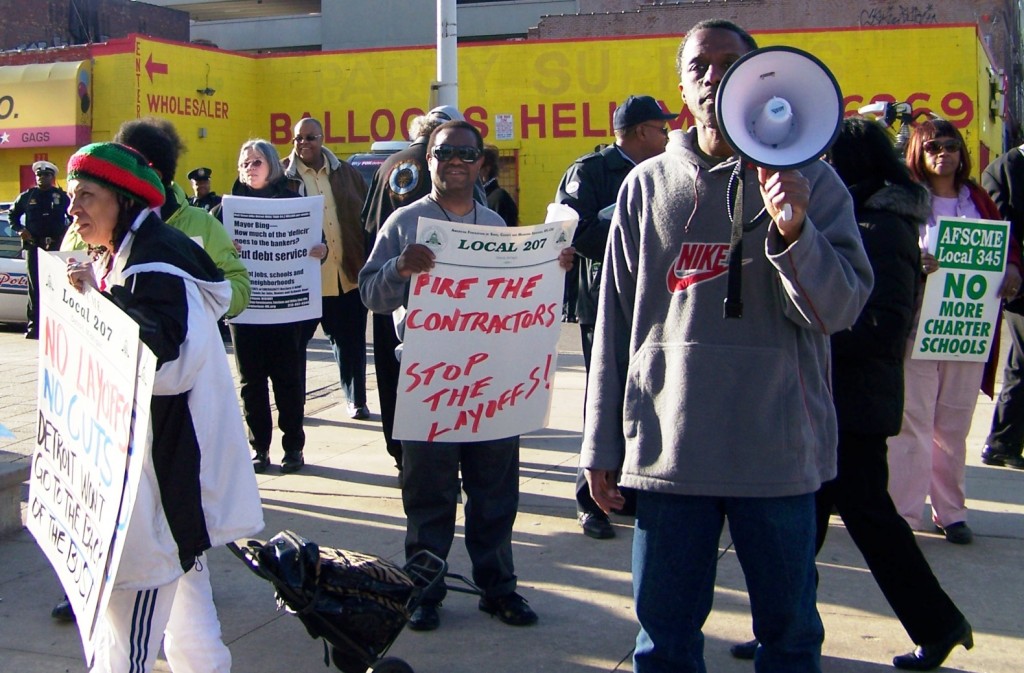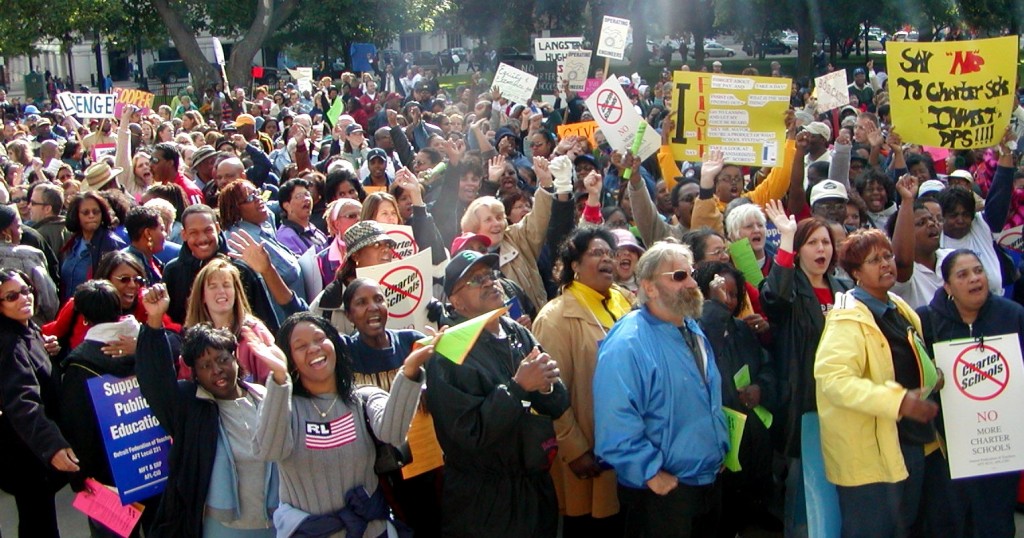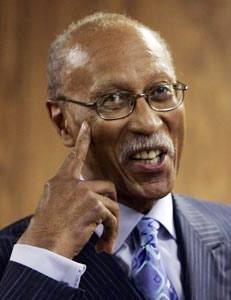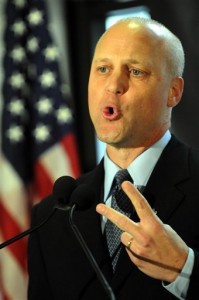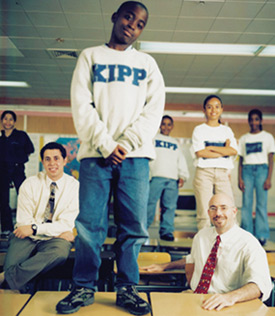PART TWO: DPS KATRINA
By Diane Bukowski
On Sat. Mar. 12, at an unpublicized Board of Education finance committee meeting, DPS czar Robert Bobb announced the “DPS Renaissance Plan 2012.” It includes an option of converting 41 schools that were slated for closure this year under the revised Deficit Elimination Plan, into charters. Other options are dissolving DPS to pay off its debt and forming a new school district, and populating DPS 100 percent with charter schools.
The district said in a release that Renaissance 2012 is “a transformative plan to radically restructure academically-failing schools and significantly reduce operating costs by seeking proposals from local and national groups and charter school operators for 41 of the district’s 142 schools. These schools, including some high schools, currently enroll some 16,000 students and selected operators based on a competitive and rigorous RFP (Request for Proposals) process to operate the schools as public school academies [ed.—charter schools] with Detroit Public Schools as the authorizer.”
It added, “The plan supports the district’s Deficit Elimination Plan by reducing operating costs by $75-$99 million and represents a dramatic new approach to declining enrollment for the 2011-12 fiscal year,”
It does NOT say, however, that the loss of 16,000 students to private charter operators would mean the LOSS OF $121.6 MILLION to the district in state per-pupil aid (currently $7600 per student) in 2012. In its DEP, the district says planned cuts will save it a little over $114 million in 2012, and a total of $281.8 million from 2011-14. Depending on how many students remain in the district as schools close, more state per-pupil aid will be lost in 2013 and 2014.
Bobb’s announcement made national headlines, in the New York Times, the Atlanta Post, and the Wall Street Journal, among others.
“We want to create a marketplace of schools,” Bobb told the Wall Street Journal. “It enables us to design a new DPS at a level that is sustainable given our current financial legacy deficit situation along with an opportunity to improve our cash flow.”
The WSJ noted, “Detroit already has a larger portion of its children enrolled in charter schools than any other major city except for New Orleans and Washington,” citing a study from the pro-charter Center for Education Reform. “Nationwide, about 1.7 million students attend more than 5,400 charters.”
DPS has already lost in funding due to the massive incursion of charter schools to date.
DPS spokesman Steve Wasko additionally told the WSJ, “We shed all physical plant operations, maintenance, security, central overhead costs. Overall staffing are expected to be lower as well. Pension costs are a major reason for this.”
The Journal said DPS officials would not say how many teachers will be laid off or have to re-apply to the charters. In the last year, Bobb laid off thousands of custodians, engineers, maintenance workers, bus drivers, and public safety officers and replaced them with private companies.
During a Sodexho “job fair” for the DPS workers last month, the company vetted applicants through credit checks, disciplinary records, drug testing, criminal checks and other means. They were not allowed union representation during the application process. (See VOD story at
Bobb said he will announce public hearings and put out Requests for Proposals for charter operators during the week of Mar. 21, but has not done so to date. His alternatives have not yet been approved at the state level.
“DPS and other districts in deficit may develop and implement initiatives that are not in their Deficit Elimination Plan,” Jan Ellis, spokesperson for State Schools Superintendent Mike Flanagan, told VOD on Mar. 16. “They will need to amend their Deficit Elimination Plan to reflect all chances they are making to reduce their deficit. The content of these plans are developed by the districts not MDE. We review and approve only. We have not received a revised plan since their announcement.”.
Unsurprisingly, school board president Anthony Adams told the daily media that he strongly supports the first-year charter school transformation. Adams was general counsel for the district under the former state-appointed CEO Kenneth Burnley, and an ardent advocate of privatization as Mayor Kwame Kilpatrick’s Deputy Mayor. (Click on VOD http://voiceofdetroit.net/?p=1569 and http://voiceofdetroit.net/?p=224 to read more about Adams.)
Adams and the Board will have no power over Bobb’s plans, however. Michigan Governor Rick Snyder signed the anti-democratic, anti-worker package of Emergency Manager bills Mar. 18, enacting Public Act 4 of 2011, despite massive opposition from huge rallies and an occupation at the Capitol in Lansing.
PA 4 bestows nearly ALL powers in cities and school districts under state receivership on “Emergency Managers,” (previously known as Emergency Financial Managers, but now endowed with absolute rule over academics and other areas as well). The criteria for declaring a governmental entity in an “emergency” are unclear and open-ended, left totally up to Snyder and renegade State Treasurer Andy Dillon (an unsuccessful Democratic gubernatorial candidate in the 2010 primary).
On Mar. 18, Wayne County Circuit Court Judge Wendy Baxter stayed her order barring Bobb from dealing with academics, even though the legislation gives DPS and other governmental entities currently under EFM control 60 days to enact the changes in the legislation.
It was no accident that Detroit Mayor Dave Bing met with New Orleans’ Mayor Mitch Landrieu in that city last month, prior to Bobb’s announcement. Bobb said he is consulting with Bing on which schools to select, to coordinate them with Bing’s Detroit Works down-sizing project, better known as the “Trail of Tears,” in which Bing plans to depopulate certain neighborhoods.
Seventy-percent of New Orleans schoolchildren now attend charter schools. (Click on http://voiceofdetroit.net/?p=719 to read VOD article Bing’s Detroit: the next New Orleans?).
After Katrina, the state of Louisiana shut down the city’s entire school district, whose student population was 98 percent Black. The district re-opened later, predominantly under state receivership, after most of its workers were laid off.
“Every teacher in New Orleans was fired,” Joe Rose, Communications Director for the United Teachers of New Orleans, told NPR’s Amy Goodman then. “There were 7,500 school employees, everybody from cafeteria workers, truck drivers and custodians to teachers, and there were about 4,000 teachers. Solid middle class employees, career professionals who had dedicated their careers to helping try to educate the children in one of the neediest cities in the country, a city with one of the highest poverty rates, as everybody saw in the days immediately following Katrina.”
Tulane University’s Cowan Institute lauded the change, at the same time noting that total enrollment in the city’s schools, including charters, had declined from 65,000 to 38,000 students.
“Those students, as a whole, are doing better in the reconstituted school system,” the Cowan Institute crowed. “Test scores, which once lagged far behind the state average, have risen rapidly since Katrina, though a majority of students are still failing standardized reading and math tests. Before the storm, nearly two-thirds of the city’s schools were labeled academically unacceptable, while in 2009, only 42 percent of schools failed to meet the state standard.”
The federal government gave a $24 million grant to the city to fund charter school development, and later agreed to spend $1.84 BILLION on construction and re-building of school buildings (most now converted to charters) damaged by Katrina.
However, post-Katrina New Orleans schools differ dramatically from the pre-Katrina system in another way. A 2008 study by the University of Michigan and the Rand Institute found that 51 percent of the city’s residents had not returned within two years of the disaster, and few planned to do so.
The report concluded, “The overall implication of these results for the future population of New Orleans is likely only very modest growth from the return of still-displaced residents. The city will continue its post-Katrina experience of being older, whiter and more highly-educated, and with fewer families, children, and people out of the labor force.”
The report noted the need for affordable rental housing to encourage return, but instead the city demolished ALL of its public housing developments, even those that had not been damaged by Katrina. Essentially, New Orleans forced out a large number of its poor Black residents, just as Bing plans to do with Detroit Works, and just as Bobb plans to do with the Detroit Public Schools.
One of the charter school operators in New Orleans is KIPP (Knowledge is Power Program), a national enterprise based in New York City. Despite generally positive publicity about KIPP generated by pro-charter forces, Brian Lack of George State University lambasted KIPP in a study published in the Journal for Critical Education Policy Studies.
“KIPP is currently receiving wholesale acclaim as a radical alternative to public schooling that works,” Lack said. “While KIPP schools ostensibly claim that college acceptance for all students is their primary goal, the principles and practices that undergird their mission are founded upon capitalistic and militaristic ideals that run counter to the ideals of democratic education. I argue that KIPP schools merely preserve the status quo by asking students to overcome overwhelming disparities through hard work and motivation, instead of addressing the structural sources of poverty and poor academic achievemen, i.e., the unequal distribution of resources in schools and society. By subscribing to a dictum of no excuses, KIPP essentially puts the onus on the victims of poverty and institutional racism. This clearly conveys the fallacy to urban students that failure in this society will solely be a reflection of not working long and hard enough, or simply not complying with rules set by those with authority.”
Click on 24518615-No-Excuses-A-Critique-of-the-Knowledge-Is-Power-Program-KIPP-within-Charter-Schools-in-the-USA[1] to access Lack’s full study.
Additionally, New Orleans charter schools are receiving support from numerous private foundations, including the Arnold Family Foundation, The Broad Foundation, Capital Group Companies Charitable Foundation, Scott S. Cowen Institute for Public Education Initiatives, John and Ann Doerr, Doris & Donald Fisher Fund, Bill & Melinda Gates Foundation, Greater New Orleans Foundation, Leslie Jacobs, Walter Isaacson, JPMorgan Foundation, New Schools for New Orleans, Edward G. Schlieder Educational Foundation, and The Walton Family Foundation.
Bobb and his Chief Academic Accountability officer Barbara Byrd-Bennett, of course are products of the ultra-conservative Broad Foundation.
Other organizations involved with New Orleans charter schools are variously described in the Manta business listing as profit or non-profit. Regarding New Schools for New Orleans, Manta says, Current estimates show this company has an annual revenue of $2,175,340 and employs a staff of approximately 2.” New Schools for New Leaders, based in New York, is listed as a non-profit.
“Knowledge Is Power, Inc in Red Lion, PA is a private company categorized under Education Centers,” says Manta. “Our records show it was established in and incorporated in Pennsylvania. Current estimates show this company has an annual revenue of $110,000 and employs a staff of approximately 5.”
Clearly these companies are looking to expand and increase their revenues on the backs of predominantly poor, Black and Latino students.

